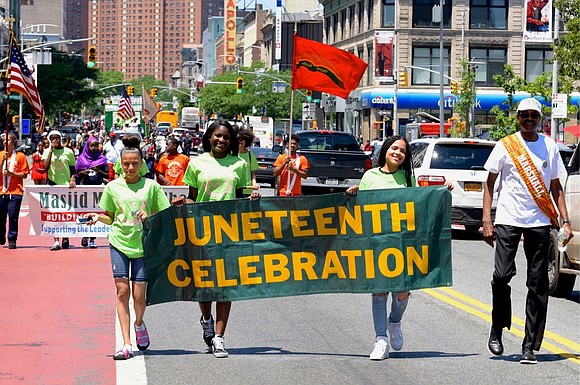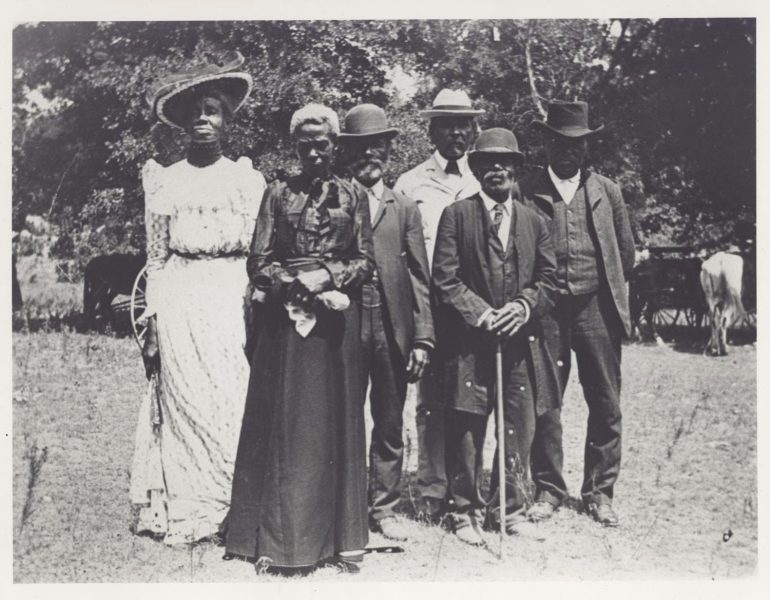Politics June 17, 2020
A look behind why making Juneteenth a national holiday needs to happen now.


Earlier this month, President Donald Trump announced a MAGA rally to be held in Tulsa, Oklahoma on June 19th. However, this date, which is also referred to as Juneteenth, is significant to the African American community. People across the country took to social media platforms to voice their outrage, to sign petitions, and to schedule protests. Citizens did this to urge the President and local politicians in Tulsa to cancel or reschedule the event. The backlash was so intense, Trump’s team did reschedule within a matter of days.
As the nation breathed a collective sigh of relief, many started to hope that their voice could, in fact, be heard. This inspired new petitions to be drafted to make Juneteenth, also known as Emancipation Day, Freedom Day, or Jubilee Day, a national holiday.
If you find yourself asking, “What is Juneteenth, and what does that have to do with Tulsa and that MAGA rally?” You’ll need to learn about two little known, but incredibly significant, events in American history. You will understand why petitioners want to make Juneteenth a national holiday, and why it is long overdue.

On June 19th, 1865 the last state in the confederacy enforced the Emancipation Proclamation, freeing the last remaining enslaved African Americans. Being the furthest state in the Union, Texas did not receive the news until two years later, with Maj. Gen. Gordon Granger reading Order No. 3 which stated:
“The people of Texas are informed that, in accordance with a proclamation from the Executive of the United States, all slaves are free. This involves an absolute equality of personal rights and rights of property between former masters and slaves, and the connection heretofore existing between them becomes that between employer and hired labor.”
Slaves present for the reading of Order No. 3 immediately erupted in celebration, and the Juneteenth holiday was born. To the freed slaves, this meant the oppressive existence they had known was going to end, and a new life full of opportunity would begin. It was a day of jubilee.
Whether you have attended a protest or riot recently, or rebuke riots and the casualties they’ve caused, you must understand the significance of The Tulsa Race Massacre of 1921, not only for every Black American, but for our nation as a whole in this current civil rights movement.
On the night of May 31, violence erupted in Tulsa, Oklahoma as mobs of angry white residents flooded the streets of Black Wall Street, an affluent Black community. These residents took to looting, burning homes and businesses, and killing men. They did not stop until the National Guard intervened the next day, arresting most of the Black population.
The numbers from that day are staggering:
36 deaths recorded, with estimates as high as 300
800 or more admitted to hospitals
6,000 Black residents interned at facilities
10,000 Black Americans left homeless
$1.5 million in real estate damage
$750 thousand in personal property damage (equivalent to over $32 million in 2019)


With our country amidst a new civil rights movement sparked by the murder of George Floyd, President Trump sought to hold a MAGA rally in Tulsa on Juneteenth.
The reason this got so much backlash was that it intersected these two important days in Black History. Trump was going to take these events and make them about himself and his campaign. His press secretary Kayleigh McEnany explained to NBC that the president was aware of both of these events. She explained that the African American community is “near and dear” to his heart and he wanted to “honor” them.
However, the people that are criticizing his choice are in agreement that this move was selfish. The argument that they make is that if he actually loved the Black community he wouldn’t be doing self-promotion on a historically racially-charged day.
Trump wanted to have his event which was meant to promote his own campaign, on the very ground where the blood of hundreds of Black Americans was spilled and their community burned to the ground almost one hundred years ago. Ignorance cannot be claimed—this is no mere coincidence.
More people and businesses than ever have united for the Black Lives Matter cause, with protests spanning the globe seeking reform and an end to racism. Throughout this movement, President Trump has stirred the flames of white supremacy and has turned a deaf ear to the anguish of Black Americans, causing a massive divide in society.
His rally in Tulsa on Juneteenth, his first rally since COVID pandemic, is no accident. Congressman Al Green called it, “more than a slap in the face to African Americans; it is overt racism from the highest office in the land. #RejectRacism.”
Rescheduling the rally was only a band-aid on the festering wound caused by centuries of racism. As a nation, with more knowledge than ever at our fingertips, we should unite to recognize our dark history and begin reconciliation.
Independence Day is our most prominent holiday, why shouldn’t Emancipation Day be just as important? After all, it marks the day that ALL Americans truly became free. This country was built by Black blood and sweat long before Black men and women were free.
With the Black Lives Matter movement sweeping our country, what better way to begin real change than to officially recognize Juneteenth as a national holiday? This was the day Black men and women awoke as slaves and went to sleep as free men and women—as Americans.
The first Juneteenth was a cause for celebration, let’s give it the place in history it deserves. A petition to make Juneteenth an official national holiday is gaining speed, with hundreds of thousands of signatures. Help make history by signing the petition today.
This personal essay came to us via our Story Submission portal. If you have thoughts on the recent instances of racial injustice, we are extending the reaches of our platform to make your voices heard. Simply click here to pitch your story.